9 Best Herbal Tinctures For Diarrhea
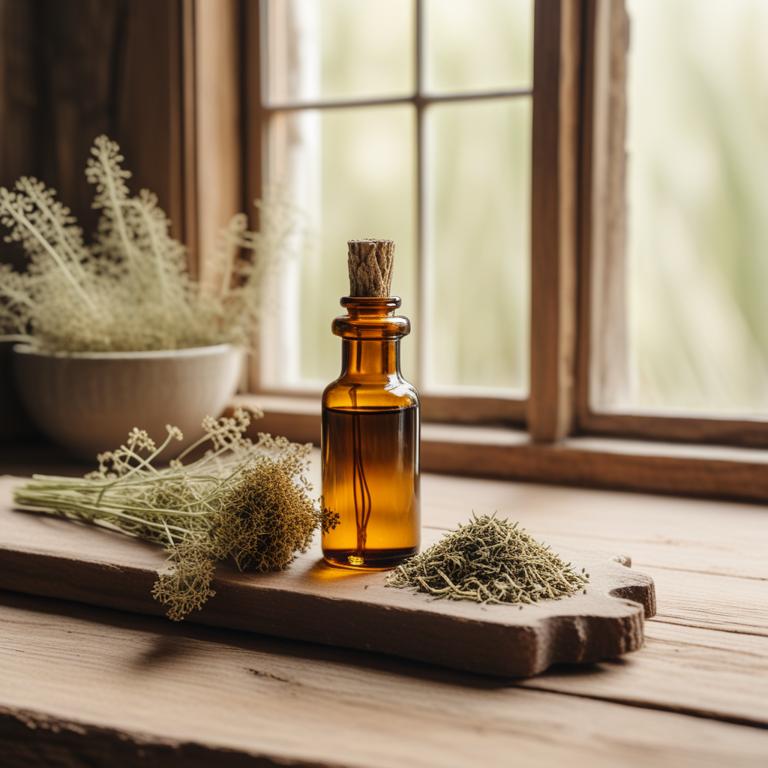
Herbal tinctures for Diarrhea are liquid extracts made from plants that have been used for centuries to treat gastrointestinal issues.
These tinctures offer numerous benefits, including quick relief from symptoms, reduced risk of dehydration, and a natural approach to healing the digestive system.
Examples of herbal tinctures used to treat diarrhea include Peppermint tincture, which helps to calm the stomach and reduce inflammation; Ginger tincture, which aids in digestion and reduces nausea; Aloe Vera tincture, which soothes the digestive tract and promotes healing; Chamomile tincture, which calms the nervous system and reduces anxiety; Fennel tincture, which helps to regulate bowel movements and reduce cramping; and Triphala tincture, an Ayurvedic blend of three herbs that promotes digestive balance and reduces diarrhea.
By incorporating these herbal tinctures into one's treatment plan, individuals can experience relief from diarrhea symptoms and promote overall digestive well-being.
According to "Current drug metabolism", tinctures for diarrhea made from herbal medicines such as scutellaria, ginger, and ginseng, containing components like wogonin, baicalin, and ginsenosides, can help relieve chemotherapy-induced diarrhea through mechanisms including anti-inflammation, inhibiting epithelial apoptosis, or promoting epithelium stem cell regeneration.
Below there's a list of the 9 best herbal tinctures for diarrhea.
- 1. Berberis vulgaris tinctures
- 2. Aloe barbadensis tinctures
- 3. Astragalus membranaceus tinctures
- 4. Glycyrrhiza glabra tinctures
- 5. Panax ginseng tinctures
- 6. Zingiber officinale tinctures
- 7. Curcuma longa tinctures
- 8. Zanthoxylum bungeanum tinctures
- 9. Foeniculum vulgare tinctures
Also you may be interested in...
TODAY'S FREE BOUNDLE
Herb Drying Checklist + Herbal Tea Shopping List + Medicinal Herbs Flashcards
Enter you best email address below to receive this bundle (3 product valued $19.95) for FREE + exclusive access to The Aphotecary Letter.
$19.95 -> $0.00
1. Berberis vulgaris tinctures
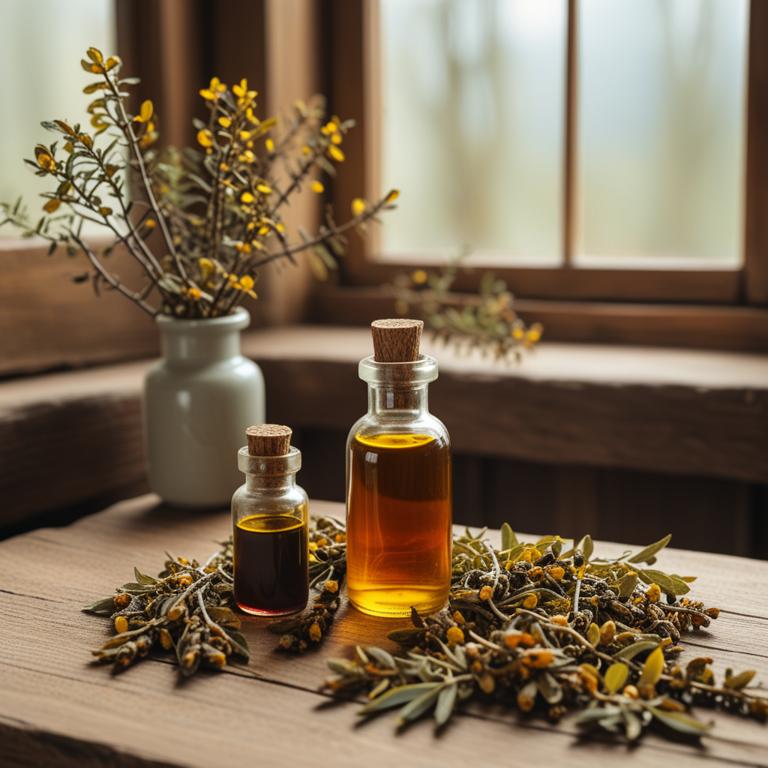
Berberis vulgaris tinctures have been traditionally used to treat diarrhea due to their antimicrobial and anti-inflammatory properties, which help to reduce the frequency and severity of loose bowel movements.
The bioactive constituents of Berberis vulgaris, including berberine, isoquinoline alkaloids, and phenolic acids, contribute to its therapeutic effects by inhibiting the growth of pathogenic bacteria and reducing inflammation in the gastrointestinal tract.
Berberis vulgaris tinctures may also help to normalize gut motility and protect the intestinal mucosa, further alleviating symptoms of diarrhea.
Overall, the use of Berberis vulgaris tinctures has been associated with benefits in treating diarrhea, including reduced frequency and duration of episodes, as well as improved gut health.
2. Aloe barbadensis tinctures
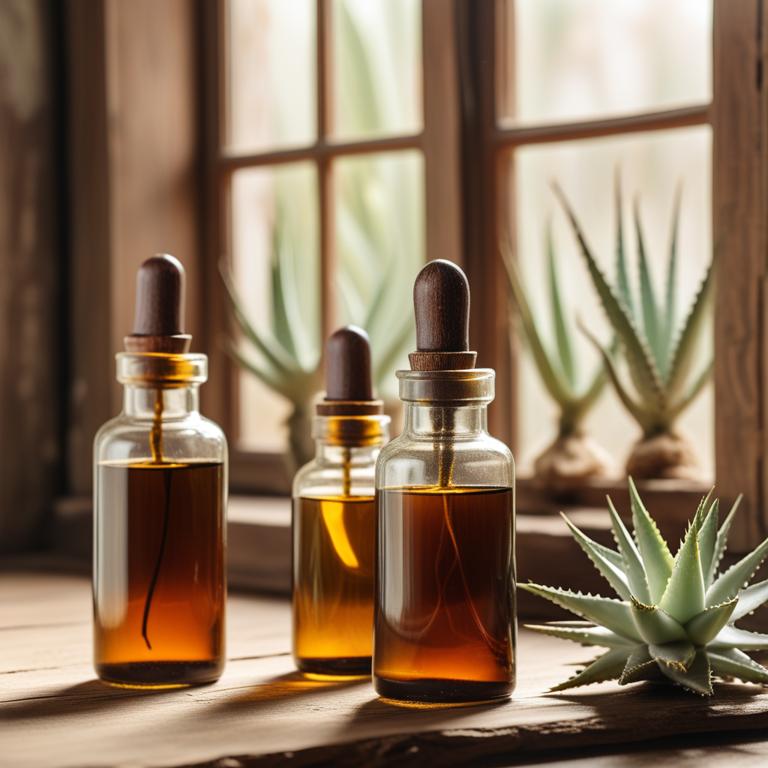
Aloe barbadensis tinctures have been used traditionally to treat diarrhea due to their anti-inflammatory and soothing properties.
These herbal preparations help to treat diarrhea by calming the digestive system, reducing inflammation in the gut, and promoting the healing of damaged tissues.
The bioactive constituents present in Aloe barbadensis tinctures, including aloin and aloe-emodin, play a crucial role in their anti-diarrheal effects by inhibiting the growth of pathogenic bacteria and reducing gut inflammation.
The benefits of using Aloe barbadensis tinctures to treat diarrhea include reducing symptoms, promoting gut health, and preventing future episodes of diarrhea.
3. Astragalus membranaceus tinctures
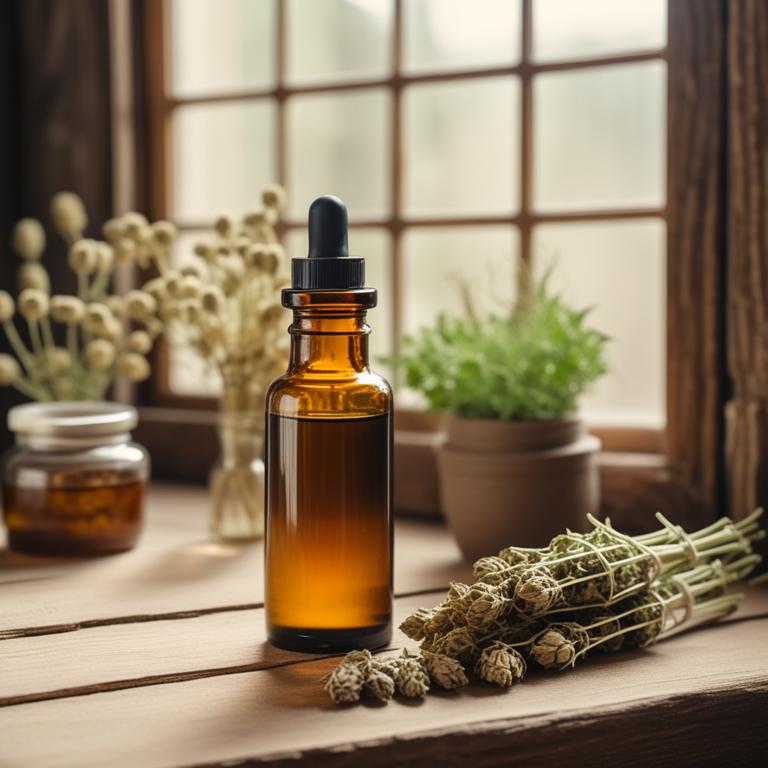
Astragalus membranaceus tinctures have been traditionally used to treat diarrhea due to their astringent and anti-inflammatory properties, which help to reduce inflammation and alleviate symptoms.
The tinctures help to treat diarrhea by reducing gut motility, promoting the absorption of fluids, and enhancing the gut's natural barrier function.
The bioactive constituents of Astragalus membranaceus, including isoflavones, saponins, and polysaccharides, play a crucial role in its anti-diarrheal effects by modulating the gut microbiome and reducing inflammation.
The benefits of using Astragalus membranaceus tinctures to treat diarrhea include rapid symptom relief, improved gut health, and reduced risk of dehydration.
4. Glycyrrhiza glabra tinctures

Glycyrrhiza glabra tinctures, derived from the roots of the licorice plant, have been used to treat diarrhea due to their anti-inflammatory and antimicrobial properties.
The bioactive constituents, including glycyrrhizin and flavonoids, help to soothe the gastrointestinal tract and reduce inflammation, thereby alleviating symptoms of diarrhea.
Glycyrrhiza glabra tinctures work by reducing gut motility, improving the gut barrier function, and decreasing the secretion of water and electrolytes, ultimately leading to a reduction in diarrhea frequency and severity.
The benefits of using Glycyrrhiza glabra tinctures to treat diarrhea include reduced symptoms, improved quality of life, and a natural, non-pharmacological approach to managing this common gastrointestinal disorder.
5. Panax ginseng tinctures
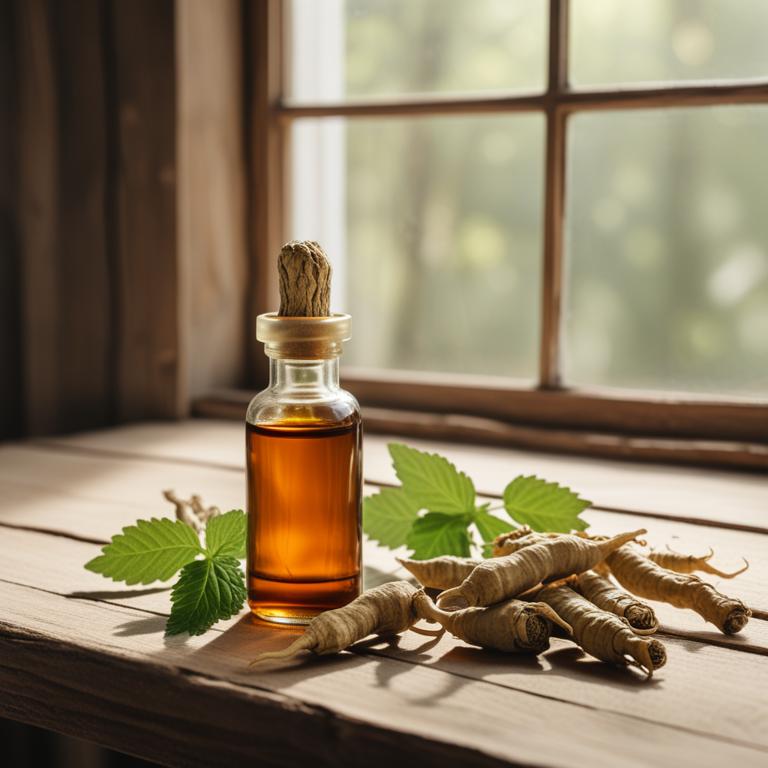
Panax ginseng tinctures are a traditional herbal remedy used to treat diarrhea, a common gastrointestinal ailment characterized by loose and frequent bowel movements.
The anti-inflammatory and antispasmodic properties of Panax ginseng tinctures help to alleviate diarrhea by reducing inflammation in the digestive tract and relaxing the muscles that control bowel movements.
The bioactive constituents of Panax ginseng tinctures, including ginsenosides and polyacetylenes, contribute to their anti-diarrheal effects by modulating gut motility and inhibiting the release of pro-inflammatory cytokines.
By regulating bowel function and reducing inflammation, Panax ginseng tinctures provide a natural and effective treatment option for individuals suffering from diarrhea, promoting a faster recovery and improved overall well-being.
6. Zingiber officinale tinctures

Zingiber officinale tinctures, derived from the rhizomes of the ginger plant, have been traditionally used to treat diarrhea due to their anti-inflammatory and carminative properties.
The bioactive constituents, including gingerols and shogaols, help to reduce inflammation and alleviate gastrointestinal discomfort, making it an effective herbal remedy for this ailment.
By reducing inflammation and inhibiting the release of stomach acid, Zingiber officinale tinctures help to slow down bowel movements and prevent the frequent and loose stools associated with diarrhea.
The benefits of using Zingiber officinale tinctures to treat diarrhea include rapid relief from symptoms, reduced risk of dehydration, and a natural approach to managing gastrointestinal health.
Related Study
According to "Current drug metabolism", Zingiber officinale tinctures for diarrhea contain gingerol as one of the main antidiarrheal components, which may relieve chemotherapy-induced diarrhea through mechanisms such as directly decreasing local drug exposure or anti-inflammation.
7. Curcuma longa tinctures

Curcuma longa tinctures have been traditionally used to treat diarrhea due to their anti-inflammatory and antimicrobial properties.
The bioactive constituents, including curcumin, demethoxycurcumin, and bisdemethoxycurcumin, help to reduce inflammation in the gut and inhibit the growth of pathogens that can cause diarrhea.
By modulating the gut microbiome and reducing oxidative stress, Curcuma longa tinctures help to alleviate symptoms of diarrhea and promote overall gastrointestinal health.
The benefits of using Curcuma longa tinctures to treat diarrhea include reduced frequency and severity of episodes, improved quality of life, and a natural, non-pharmacological approach to managing this common ailment.
Related Study
According to the study, Curcuma longa tinctures for diarrhea may be beneficial due to its high concentration of antioxidants and inhibitory action against most bacterial strains, making it a potential co-therapeutic agent in healing gastrointestinal infections.
8. Zanthoxylum bungeanum tinctures
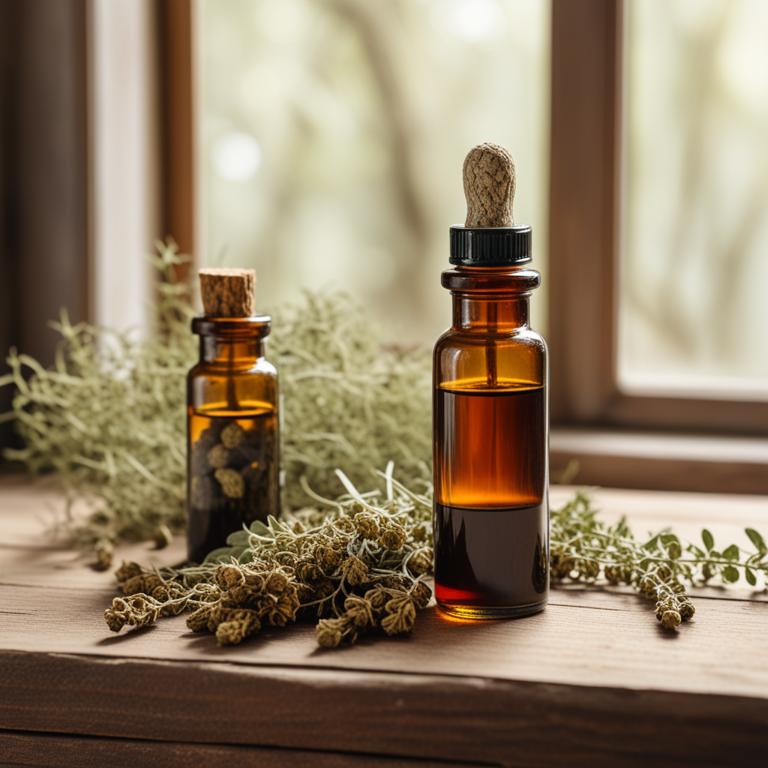
Zanthoxylum bungeanum tinctures have been traditionally used to treat diarrhea due to their anti-inflammatory and antiseptic properties.
The bioactive constituents present in this herbal preparation, such as alkaloids and phenolic compounds, help to reduce inflammation in the gastrointestinal tract and prevent bacterial overgrowth, thereby alleviating diarrhea symptoms.
By regulating bowel movements and enhancing gut health, Zanthoxylum bungeanum tinctures provide relief from diarrhea and its associated discomforts.
The benefits of using this herbal preparation to treat diarrhea include its safety profile, ease of administration, and potential to reduce the risk of complications associated with prolonged diarrhea episodes.
9. Foeniculum vulgare tinctures
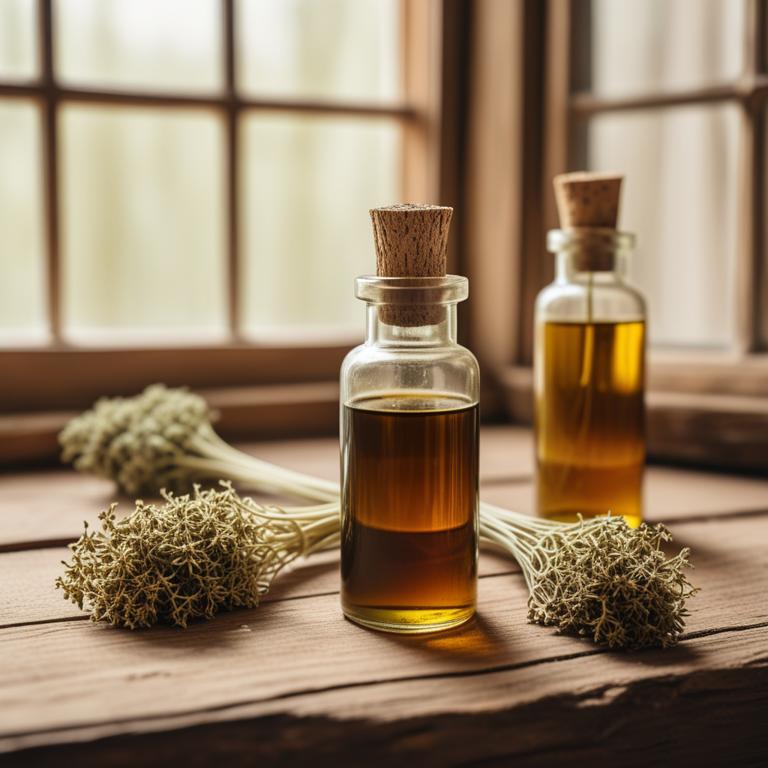
Foeniculum vulgare tinctures, derived from the seeds of the fennel plant, have been traditionally used to treat diarrhea due to their antispasmodic and carminative properties.
These properties help to relax the muscles in the digestive tract and reduce inflammation, thereby alleviating symptoms of diarrhea.
The bioactive constituents of fennel tinctures, including anethole and limonene, help to slow down the movement of food through the digestive system and reduce the frequency of bowel movements.
The benefits of using fennel tinctures to treat diarrhea include reduced symptoms, improved digestion, and a decrease in the risk of dehydration, making it a natural and effective remedy for this common ailment.